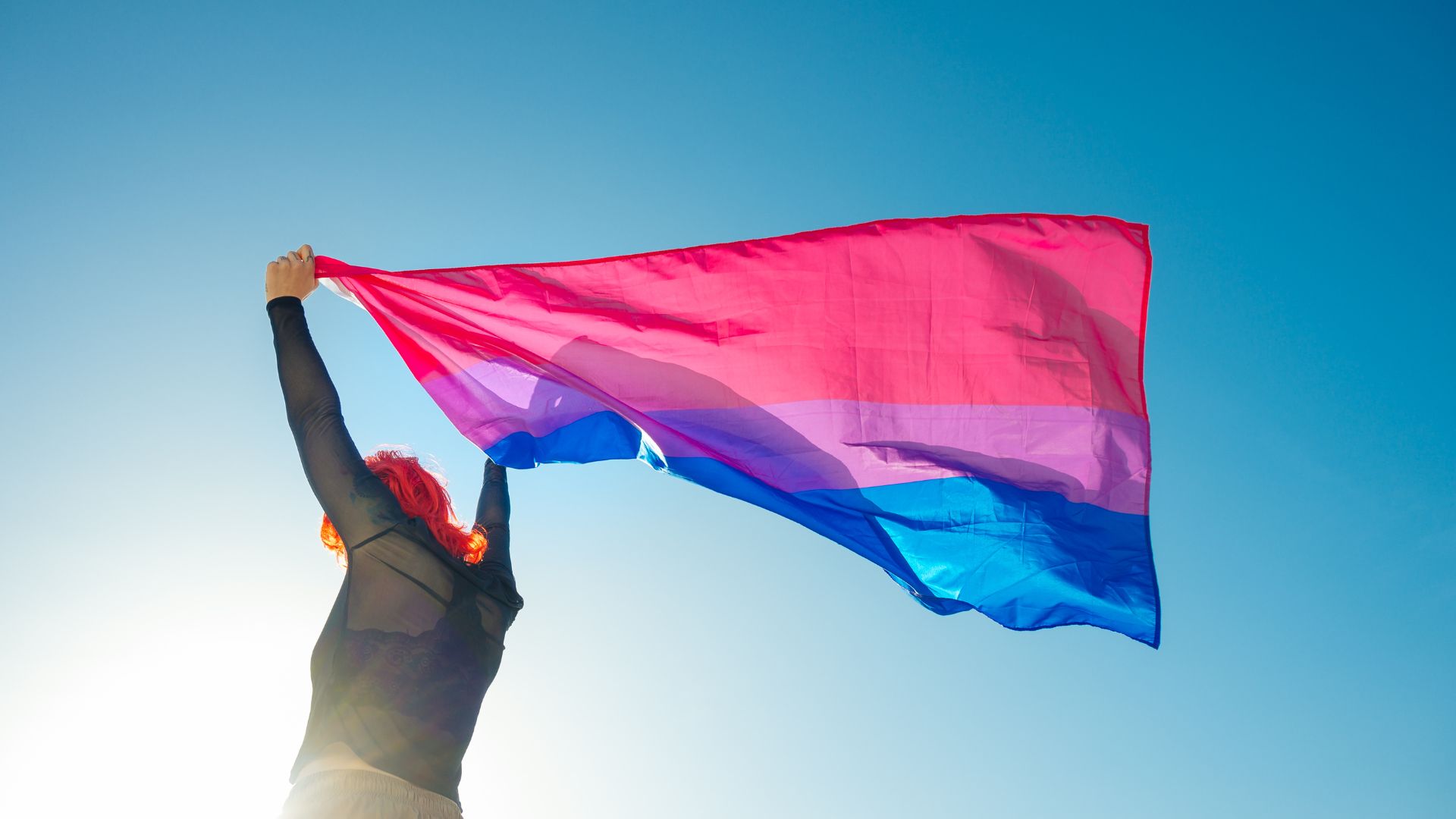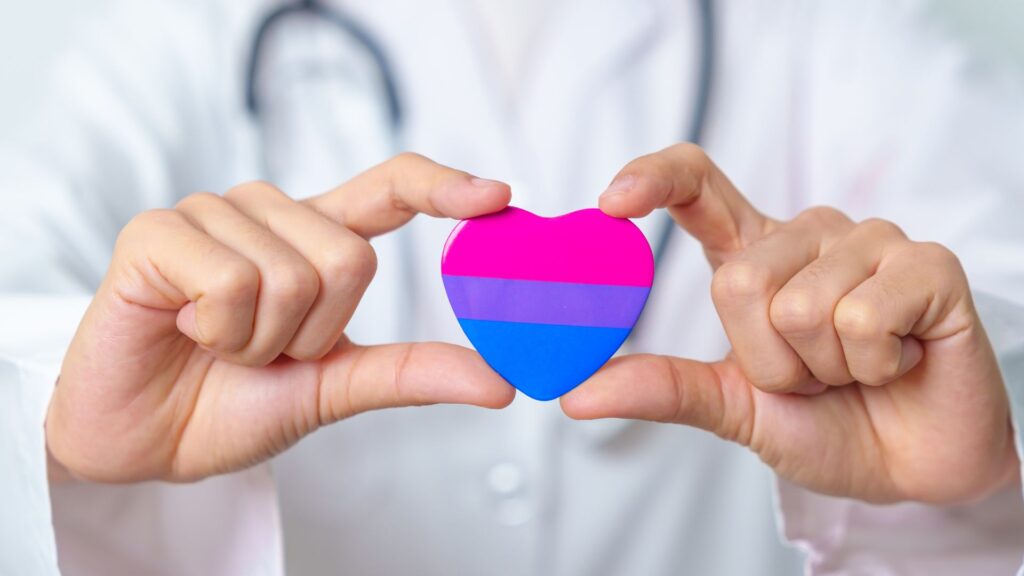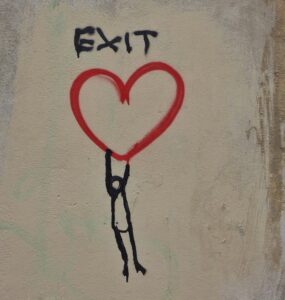You’re Not Alone: How to Recognize and Heal from Bisexual Imposter Syndrome

Bisexual imposter syndrome is the nagging feeling that your bisexuality isn’t “real” or valid enough. Many bisexual people—whether they’re in same-sex relationships, heterosexual relationships, or “straight-passing” partnerships—struggle with these thoughts. This can stem from bisexual erasure, harmful stereotypes, and the alienating experience of not feeling fully accepted in either the gay community or straight spaces. The mental health consequences of this can include bouts of imposter syndrome, anxiety, and even depression.
According to a study in the Journal of Sex Research, bisexual individuals often face higher rates of mental health challenges than gay or straight people due to unique stressors like bi-erasure and negative stereotypes. Similarly, Robyn Ochs emphasizes that bisexuality encompasses a broad spectrum of sexual attraction and experiences, and every bisexual experience is valid.
In this article, we’ll explore:
- What bisexual imposter syndrome is and how it relates to queer imposter syndrome.
- Tips for accepting bisexuality and embracing your identity.
- How therapy can help overcome imposter syndrome around sexuality.
Ready to claim your space in the bisexual community? Let’s dive in!

What Is Bisexual Imposter Syndrome?
The bisexual community faces unique challenges in the fight for visibility and acceptance. Although clearly represented as the “B” in LGBTQ+, bisexual folks often find themselves having to defend the legitimacy of their sexuality. They encounter bi-phobia perpetrated both within and outside of the queer community.
They’re told that bisexuality is just a phase, or that being bi is the first step toward coming out as gay. They’re labeled as “confused” or “greedy” and told to “pick a side”. They’re presumed to be 50% gay and 50% straight. These stereotypes are reinforced by straight folks, typically as a result of internalized homophobia, as well as by queer folks, in a way that feels like gatekeeping.
Bisexual imposter syndrome is the persistent feeling that your bisexual identity isn’t valid—that you’re somehow not “queer enough” to belong in the LGBTQ+ community. This feeling often stems from bisexual erasure and harmful stereotypes that reduce bisexuality to a phase, confusion, or a need for attention. It’s a uniquely alienating experience that affects bisexual people emotionally and socially.
How Does Bisexual Imposter Syndrome Manifest?
Emotionally, it can lead to:
- Self-doubt: Questioning your sexual experiences or aesthetic attraction to others.
- Anxiety: Feeling uneasy about expressing your bisexuality in queer spaces or straight spaces.
- Mental health consequences: Increased risk of depression or low self-esteem.
Socially, it can show up as:
- Feeling excluded: Not fully accepted by the gay community or straight people.
- Fear of judgment: Worrying that a “straight-passing” relationship or a lack of same-sex marriage experiences invalidates your sexual identity.
- Internalized bi-erasure: Believing that your sexual attraction needs to meet the “50-50 attraction” stereotype to be real.
Whether you’re navigating queer imposter syndrome in community events or wrestling with long-term relationships that seem to “define” your sexuality, it’s important to remember that every bisexual experience is valid. Accepting bisexuality is key to overcoming these foreign feelings and embracing your identity.
Understanding Queer Imposter Syndrome and Its Impact
Queer imposter syndrome is the feeling that you don’t truly belong in the LGBTQ+ community. For bisexual people, this often overlaps with bisexual imposter syndrome, creating a unique and challenging mental space.
How Queer Imposter Syndrome Affects Mental Health
- Barriers to self-acceptance: When bisexual women, transgender people, or queer people are told their bisexual identity isn’t valid, they may struggle with accepting bisexuality as a legitimate sexual identity.
- Mental health consequences: Queer imposter syndrome is linked to increased anxiety and depression due to the pressure of “proving” one’s queerness in queer spaces.
- Alienating experiences: For those in “straight-passing” relationships, like a queer woman with a male partner, the pressure to validate their place in the bisexual community or gay spaces can lead to self-doubt.
Additional Reading: Learn more about How to Overcome Depression: Practical Steps.
Normalizing the Experience
- Feeling unsure of your bisexual experience or aesthetic attraction is common but doesn’t make your bisexual identity any less real.
- Acknowledging the role of societal factors like the “50-50 attraction” myth and bi-erasure stereotype can help contextualize these bouts of imposter syndrome.
Bisexuality is about recognizing and validating sexual attraction to more than one gender, not about meeting external standards. Normalizing these feelings is a step toward embracing your unique sexual experiences and finding safer spaces in the queer community.

Recognizing the Signs of Bisexual Imposter Syndrome
Bisexual imposter syndrome often sneaks into your thoughts and relationships, leaving you questioning your identity and sense of belonging. Recognizing the signs is the first step toward breaking free from these doubts and embracing your bisexual identity.
Common Thoughts and Behaviors
- Feeling like you don’t “qualify” as LGBTQ+: Many bisexual people experience bouts of imposter syndrome, thinking they don’t fit into queer spaces or the queer community.
- Comparing yourself to others: Whether it’s a queer woman in a same-sex marriage or a gay person attending every Pride event, comparisons can make you feel like your experiences of imposter syndrome mean you’re somehow “less queer.”
- Avoiding discussions about your sexuality: Fear of invalidation or erasure of bisexuality often leads to silence, especially in straight spaces or among friends unfamiliar with bisexual experiences.
Emotional and Relational Impacts
- Increased anxiety and self-doubt: These feelings stem from harmful stereotypes about bisexual attraction.
- Challenges in forming meaningful relationships: Bisexual women and others in “straight-passing” relationships may feel alienated, fearing judgment from both the gay community and straight people.
- Struggles with authenticity: Whether it’s coming out or expressing your sexual identity in a long-term relationship, these challenges can make queer imposter syndrome feel overwhelming.
Self-doubt and insecurity can morph into a strange sense of imposter syndrome. Often, bi folks wonder if they’re “gay enough” to be considered a part of the LGBTQ+ movement. They ask themselves whether they belong in queer spaces, like gay bars or Pride parades. They struggle through the coming out process, wrestling with the decision to disclose their sexuality for fear that their family members will write them off as “experimenting” or their partners will question their fidelity to the relationship. Constantly having to explain themselves and defend their sexuality translates into higher rates of anxiety, depression, and many other mental health concerns.
Healing from Imposter Syndrome and Accepting Bisexuality
Bisexual imposter syndrome can feel isolating, but healing is possible through self-acceptance, supportive communities, and professional guidance. Let’s break down the steps to help you reclaim your bisexual identity and overcome the doubts created by societal stereotypes and internalized stigma.
Steps to Start Accepting Bisexuality
- Validate your own experiences:
- Bisexuality doesn’t require an equal “50-50 attraction” to different genders or specific sexual encounters.
- Your feelings—whether you’re in a heterosexual relationship, a same-sex marriage, or navigating queer spaces—are valid and real.
- According to Psychology Today, self-validation is crucial for combating bi-erasure and reclaiming your bisexual experience.
- Find supportive spaces:
- Join LGBTQ+ community events or online groups that prioritize safe spaces for queer people.
- Engage with the bisexual community, where your experiences will be understood and affirmed.
- Surround yourself with individuals who reject harmful stereotypes and uplift bisexual women, men, and nonbinary people.
- Practice self-compassion:
- Replace self-criticism with kindness. Accept that everyone’s journey is unique.
- According to The Trevor Project, self-compassion is a proven method for improving mental health outcomes among bisexual people and other LGBTQ+ identities.
Additional Reading: Read more about Self Acceptance Therapy: Embracing Your True Self.
Seeking Help for Imposter Syndrome
- The benefits of therapy: Therapy provides a safe space to explore the challenges of queer imposter syndrome, bisexual erasure, and the alienating experience of navigating “straight-passing” relationships.
- Affirming counselors: LGBTQ+ specialized therapists can guide you in unpacking societal stigma and embracing your bisexual identity.
Affirming therapy helps bisexual individuals reduce bouts of imposter syndrome sexuality and fosters long-term mental health improvements. Healing starts when you seek the support you deserve.

Find Support and Healing at Counseling Associates for Well-Being
If you’ve been struggling with bisexual imposter syndrome or queer imposter syndrome, you don’t have to navigate it alone. At Counseling Associates for Well-Being, we understand the unique challenges bisexual people face.
Our clinicians specialize in treating a wide range of issues, including:
- LGBTQ+ concerns like accepting bisexuality and exploring your bisexual identity.
- Relationship challenges, whether you’re in a heterosexual relationship, same-sex marriage, or navigating long-term partnerships.
- Trauma, anxiety, depression, and other mental health consequences tied to bouts of imposter syndrome sexuality or societal stigma.
At Counseling Associates for Well-Being, our mission is to help you feel seen, validated, and supported as you embrace your authentic self. Whether you’re a queer woman, trans person, or exploring your place in the bisexual community, our team is here to provide a judgment-free, affirming environment.
Ready to start your journey toward healing and self-acceptance? Reach out today and let us help you reclaim your well-being.


